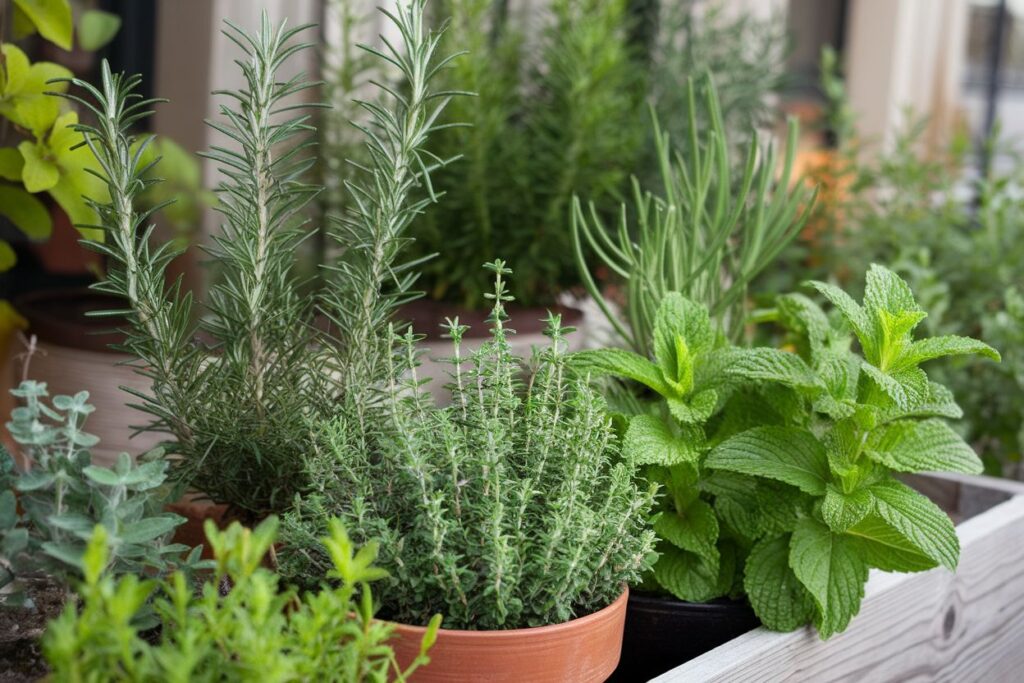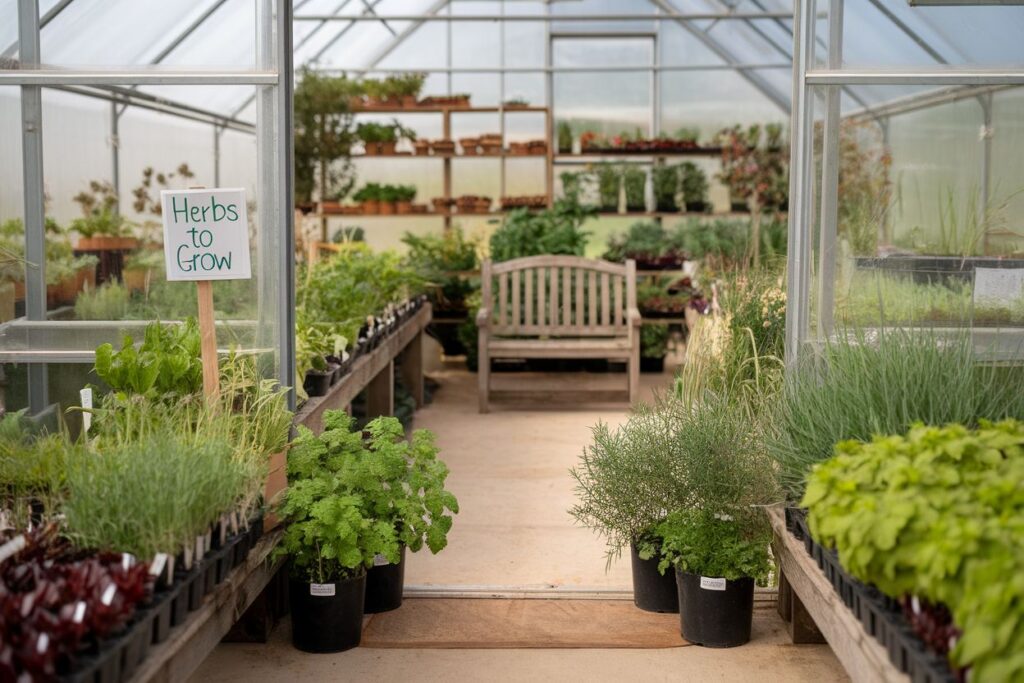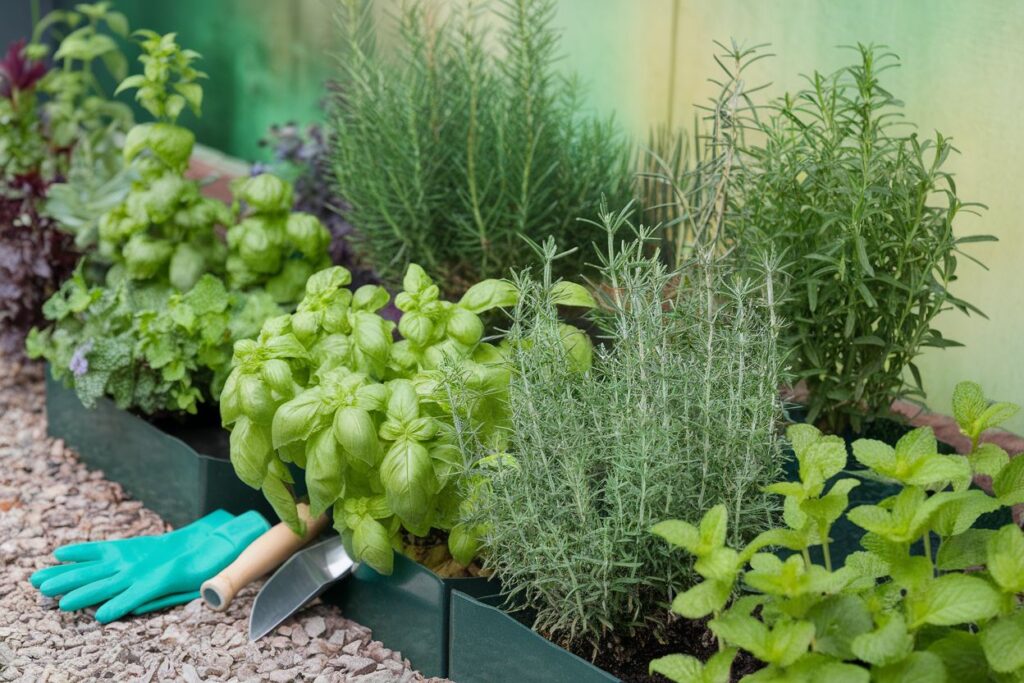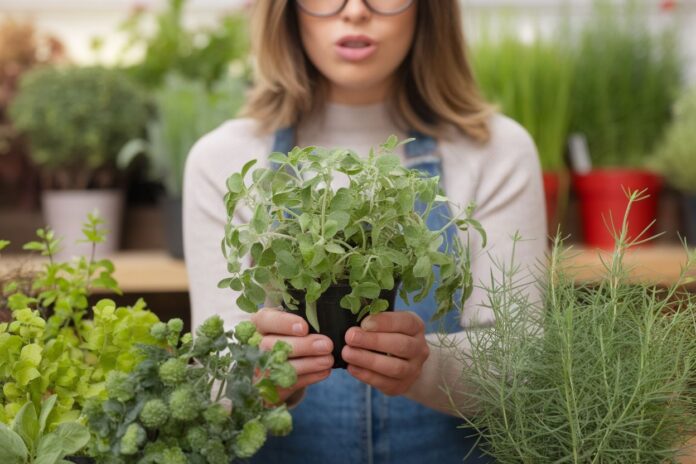Gardening fans often ask about planting herbs all year. Growing herbs isn’t the same for everyone. You need to know the right conditions and what each plant needs.
Many things affect growing herbs, like the climate, temperature, sunlight, and the type of herb. Some herbs do well indoors in winter, while others need certain seasons to grow. Tips for growing herbs suggest changing your approach based on your area’s weather.
Experts say different herbs have their own growing likes. Basil, rosemary, thyme, and mint each react differently to the seasons. Knowing this can help you have a great herb garden all year.
Learning to plant herbs all year takes time, research, and trying new things. Whether you use indoor pots or outdoor beds, knowing how to garden for herbs all year will make your cooking and gardening better.
This guide will show you how to plant herbs all year. You’ll learn to grow fresh, tasty herbs no matter the season. Let’s explore the world of herb gardening and find out how to garden all year.
Understanding the Growing Seasons for Fresh Herbs

Herb growing seasons change a lot because of many factors. Gardeners need to know the big differences between growing herbs inside and outside. This helps them grow herbs all year round.
Climate zones for herbs are very important. They tell us when and how herbs can grow best. Each area has its own weather patterns that affect herbs in different ways.
Indoor herb gardening lets gardeners control the growing conditions. This means they can keep the temperature just right, no matter the weather outside. Herbs like basil, parsley, and chives do great indoors.
Planting herbs outside depends a lot on the local climate. Herbs from the Mediterranean, like rosemary and thyme, love warm weather and lots of sun. Places with temperate climates offer a good chance to grow many different herbs.
“Understanding your local climate is the first step to successful herb cultivation.” – Professional Gardening Expert
Most herbs do best in temperatures between 60-75°F. Some herbs are very sensitive to cold or heat. It’s important to know the exact temperature needs for each herb to help them grow well.
How to Plant Herbs Successfully in Different Seasons
Successful herb gardening means knowing how to handle each season’s challenges. The way you plant herbs changes a lot from spring to winter. Being flexible is key for gardeners.
In spring, get your herb garden ready for growth. Choose herbs like parsley, cilantro, and chives that do well in cooler weather. These can go straight into the ground or pots.
“The secret to successful herb gardening is working with nature’s rhythm, not against it.” – Professional Gardener
Summer brings different needs for herb planting. Pick herbs like basil, rosemary, and thyme that handle the heat. Make sure they get some shade to avoid burning. Mulch keeps the soil moist and cool.
Fall is a great time for certain herbs. Plant perennials like sage, oregano, and mint that can handle cooler weather. Use a thin layer of mulch to keep them warm as it gets colder.
Winter herb gardening needs careful planning. Use indoor spots, greenhouses, or sunny windowsills to grow herbs. Mint, chives, and thyme do well indoors, as long as they get enough light and stay warm.
Best Time to Plant Herbs in Your Region
Knowing your local climate and seasonal changes is key to growing herbs. Each herb has its best time to grow, making timing very important. It’s crucial to know your area’s weather and soil conditions for a successful garden.
Local weather greatly affects when to plant herbs. Every area has its own temperature and moisture levels. These conditions can make or break your herb garden.
Spring is a great time to start your herb garden. Warm-season herbs like basil and parsley do well after the frost. Make sure the soil is at least 60°F for the best germination.
Summer gardening needs careful handling of heat and moisture. Herbs like rosemary and thyme love the heat. But, they need shade and regular water to avoid burning from the sun.
Growing herbs in fall and winter can be tough but rewarding. Herbs like chives and mint can handle the cold. Indoor gardens are a lifesaver during these seasons, keeping your herbs fresh all year.
“The secret to successful herb gardening is understanding your local growing conditions and adapting your techniques accordingly.” – Professional Gardening Expert
Indoor Year-Round Herb Gardening Techniques

To grow herbs indoors all year, you need a plan and the right tips. You can turn your kitchen into a lively herb garden. This is possible with the right indoor gardening advice.
Light is very important for growing herbs indoors. Most herbs need 6-8 hours of sunlight a day. If sunlight is scarce, use LED grow lights. They give steady light and keep herbs healthy all year.
“The secret to successful indoor herb gardening is mimicking natural growing conditions,” says professional herbalist Maria Rodriguez.
Keeping the temperature right is also key. Most herbs do best in temperatures between 65-75°F. Don’t put herbs near drafts or heating vents. This keeps the temperature steady and helps herbs grow well.
To make the most of indoor space, use smart solutions. Try vertical gardens, hanging planters, or small containers on windowsills. These ideas work great in small places. Make sure your containers drain well to prevent root rot.
Picking the right herbs for indoors is important. Basil, chives, mint, and parsley do well indoors. These herbs add flavor to your cooking and are available all year.
Essential Tools and Materials to Plant Herbs

Starting an herb garden needs careful planning and the right tools. You must pick the best soil and containers. Every step is crucial for growing healthy herbs.
For a thriving herb garden, you’ll need specific tools. These include hand trowels, pruning shears, gardening gloves, and soil testing kits. These tools are essential for a successful garden.
Herbs need different soil than regular garden soil. They prefer well-draining, slightly alkaline soil with lots of organic matter. A mix of potting soil, compost, and perlite is perfect for herbs like basil, thyme, and rosemary.
“The secret to healthy herbs is understanding their soil preferences.” – Professional Gardening Expert
Herb containers must drain well and give roots room to grow. Terracotta pots, ceramic planters, and wooden boxes are great choices. Make sure they have drainage holes and are at least 6-8 inches deep.
Indoor herb gardens need the right light. Grow lights for herbs help when there’s not enough natural light, like in winter. LED grow lights with full-spectrum capabilities are best for photosynthesis and steady growth.
Common Mistakes When Growing Herbs Off-Season
Growing herbs off-season can be tricky for gardeners. Many make mistakes that harm their herb garden’s health and growth. Knowing these common errors is key to growing herbs all year.
“The secret to troubleshooting herb gardens lies in recognizing and addressing potential issues before they become serious problems.” – Professional Herb Gardener
Keeping the right temperature is crucial for off-season herb growing. Indoor herbs face challenges with changing environments. Avoid placing them near drafts or heat sources.
Stable temperatures between 60-70°F are best. This helps prevent shocking the plants.
Lighting is also vital. Many gardeners overlook the need for enough light in the dark months. Grow lights can help make up for less sunlight, ensuring herbs grow well.
Watering is another area where mistakes are common. Overwatering is especially risky when plants grow slower. Adjust your watering schedule. Let the soil dry a bit between waterings. Use containers that drain well to avoid root rot.
Nutrient management is tough during off-season. With less sunlight and slower growth, fertilizing carefully is important. Use a balanced, water-soluble fertilizer at half-strength. This gives plants the nutrients they need without overloading them.
Seasonal Care and Maintenance Tips
Keeping an herb garden healthy all year needs a smart plan. Gardeners must learn how to care for their herbs in every season. This ensures they stay healthy and grow well.
Watering herbs is all about knowing what each one needs. Some herbs like dry conditions, while others need more water. For example, rosemary and thyme like it dry, but basil and parsley need more moisture.
“The key to successful watering is understanding each herb’s specific water needs and creating a balanced irrigation strategy.” – Professional Herb Gardener
Pruning herbs keeps them strong and stops them from getting too big. It also helps them grow bushier and prevents them from flowering. This keeps their flavor good. Use sharp scissors to cut off about a third of the plant’s height each time you prune.
Keeping pests away from herbs is important. Use natural methods like neem oil and companion planting. Also, check your plants often for pests. Keeping them spaced out and well-ventilated helps prevent pests too.
Final Thoughts
Growing herbs is easy and rewarding, fitting into many environments and seasons. To grow herbs well, know your local climate and choose the right growing methods. It’s important to match herbs with your growing conditions, whether indoors or outdoors.
Year-round herb gardening is not only possible but also achievable. With the right knowledge, you can create a thriving herb garden. Indoor growing adds flexibility, helping you grow herbs even when it’s hard outside.
Planning is key in herb growing. Think about light, soil, water, and pests. Each herb has its own needs, so be ready to adapt. With care and patience, your herb garden will flourish all year.
Herb cultivation is both a science and an art. Begin small and learn as you go. By following this guide, you’ll become skilled in growing herbs in any setting.











